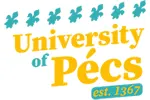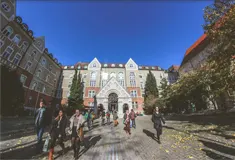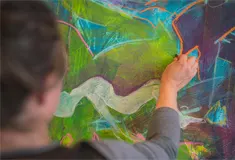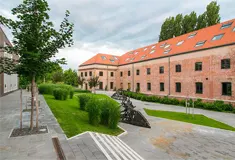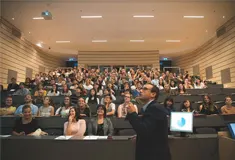In all cases, the international relations coordinator forwards the application materials to the relevant admission committee. If the committee decides that on the basis of the application material the applicant should take an oral exam, the applicant will be interviewed in person or via Skype. A Skype interview will be conducted if the applicant's attendance is impeded and the examination committee offers them the opportunity to be interviewed via Skype. Applicants are given two possible dates for the interview, taking into account any time zone differences.
Parts of the entrance exam:
- Aptitude test
- Practical exam
1. Requirements of the aptitude exam
WRITTEN EXAM
Solfeggio – Music theory
- notation of a two-part Baroque of Classic Viennese melody
- development of a harmony exercise
ORAL EXAM
Piano
Singing
- performance of an art song without music sheet (accompaniment provided by the committee)
- performance and analysis of a freely chosen Hungarian folk song. The song should be performed from memory, striving for the appropriate performance style
Comprehension interview
During the interview, applicants display their ability to interpret texts, and their speaking and communication skills, as well as their career aptitude and musical literacy are assessed.
Assessment of the aptitude test: pass/fail
2. Requirements of the practical exam
WRITTEN EXAM
- Solfeggio
- notation of one-part 20th century melody
- notation of a two-part Baroque or classical Viennese style melody
- Music theory
- notation of a harmony assignment based on dictation, or notation of a four-part chorale using scale degree notation
- development of a harmony assignment
ORAL EXAM
1. Solfeggio
- sight reading and singing diatonic melodies, with slight alterations and modulation to related key
- singing, recognising sound sequences, intervals, harmonies and their translations by listening
2. Music Theory
- harmonic exercises by dictation
3. Piano (all pieces must be performed without the use of sheet music)
- an etude
- a piece by Bach
- a movement from a sonata composed in sonata form
- a freely chosen piece
4. Singing
- two songs of different style and character sung with piano accompaniment (accompaniment provided by the committee)
- Singing and analysing 30 Hungarian or other freely chosen folk songs. The candidate must present the list of songs to the committee. The songs must be performed from memory, with the lyrics, striving for an appropriate singing style. In case of non-Hungarian folk songs, the sheet music must be provided for the committee.
5. Conducting practice
- orchestral: based on individual preparation W. A. Mozart: A Little Night Music and F. Schubert “Unfinished” Symphony in B minor
- choir: conducting a piece selected by the entrance exam committee after preparing on-site
6. Career aptitude interview
- Speech and communication skills displayed during the entrance exam; assessment of presumed aptitude based on this
- questions to assess musical literacy
PARTS OF THE ENTRANCE EXAM AND THEIR EVALUATION:
Assessment of the aptitude exam: “pass” or “fail”.
A maximum of 200 points can be achieved at the practical entrance exam, which is doubled.
Written exam: a maximum of 100 points.
- Solfeggio, harmonics, music theory 0-100 points
Those who do not achieve at least 50 points out of the 100 points obtainable in the written exam may not continue the entrance examination.
Oral exam: a maximum of 100 points.
- solfeggio 0-20 points
- harmonics and music theory 0-20 points
- piano 0-15 points
- singing 0-15 points
- conducting practice 0-20 point
- career aptitude interview 0-10 points
If the applicant does not have a language proficiency certificate, but on the basis of the oral entrance examination their language proficiency is sufficient to complete the relevant programme, the entrance examination committee may waive this criterion.


